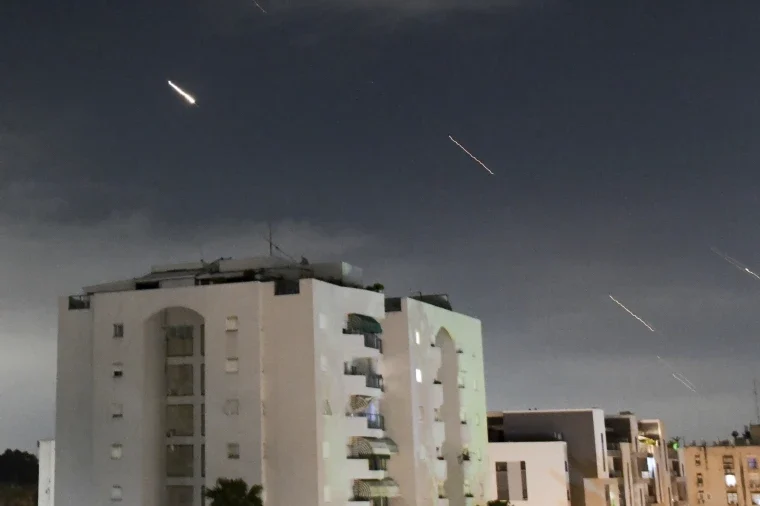Relations between Israel and Iran remained strained since the Iranian revolution of 1979. 2023 Israeli state sponsored massacre of innocent Palestinians heightened this animosity. Iran through its proxies in Middle East continued to give a tuff time to Israel. In midst of such tense environment, on April 1st 2024 Israel launched air strikes on Iranian embassy in Damascus (Syria). These strikes resulted in the death of Brigadier General Mohammad Reza Zaidi (Senior Quds force commander of IRGC), some IRGC senior officials, an Iranian advisor and two civilians. Since then international community is concerned about escalation in Middle East.
Iranian leadership vowed to punish Israel for this offense. Sensing the threat, USA (Israel’s historic defense ally) warned Iran from taking any offensive move against Israel. On 13th April 2024, Iran retaliated Israel’s illegal assault by launching hundreds of drones and missiles strikes on Israel. An important point to note about these strikes is that these were launched directly from Iranian territory for the first time in history. According to reports, the operation code named “True Promise”, Israel (1,770 km away from the launching site) was targeted with a total of 170 drones, 120 ballistic missiles and 30 cruise missiles. Variety of missiles and drones was aimed at countering Israeli air defense system. Despite this effort about 99% of the weapons were intercepted and destroyed by US-Israel defense system, before reaching the target. Attack resulted in a modest damage to Israeli military facilities, with zero death and just one injury.
Israeli military claimed to shot dead more than 300 drones and missiles launched by Iran. In a statement Israeli PM, Benyamin Netahyahu, said: “we intercepted, we blocked and together we will win”. In this statement “we” is conceived as Israel and USA. But this group also include Britain, France and Jorden as well. Lior Haiat (Spokesperson of Israel Foreign Office) said: “Iran must pay a price for this aggression”. In a similar statement Israel’s Defense Chief (Yoav Gallant) said that the “confrontation with Tehran is still not over”. In another statement Israeli military warned of dangerous escalation in the region. Thus risk of escalation looms higher between a nuclear capable and nuclear aspiring state.
Iran claims that operation ‘true promise’ was in self defense and it now considers the operation concluded and have no intension of escalation. Major General Mohammad Bagheri (Iran’s Military Chief) said that: “If Israel retaliates against Iran, it will instigate a much larger response from Iran”. On similar lines Ebrahim Raisi (Iranian President) said: “If Zionist regime or its supporters demonstrates reckless behaviour, they will receive decisive response”.
Having the long standing defense and strategic partnership with Israel and hostility with Iran, USA is a critical player in Israel-Iran tensions. Being overwhelmingly committed to Indo-Pacific region, USA don’t want any escalation in Middle East. Thus it will try its best to convince Israel for not retaliating to Iranian move. US president conveyed to Israeli PM that it will not be a part in offensive operation against Iran and discussed its intent of convening a meeting of G7 for discussing a coordinated diplomatic response against Iran.
Situation is still in its initial phase and it is difficult to said how exactly Israel will respond and what path USA will follow, since it retreated that its “support to Israel is ironclad”. Whether this tension will transform into a regional/global conflict is a big question mark.
Here it is important to analyse the successes and failures of Iran’s “True Promise”.
Politically, Iran claimed that “True Promise” was in response to Israeli air strikes on Iranian embassy in Syria. In such a situation, for avoiding international pressure and for maintaining its red lines a state is supposed to retaliate within 48 hours. But in this case Iran took more than 10 days for retaliation. Delayed response raises a lot of questions.
Since Iran vowed to avenge Israel but actually the large scale Iranian assault didn’t resulted in major damage to Israel. Thus politically it can be termed as a face saving attempt by Iranian government who successfully retained its honour publically. Further it also added to Iranian soft power in the Muslim world. Public in the Muslim world considers Iran as a hero working for the Palestinian cause as compared to other regional Arab states.
On the strategic level, Iran is considered as the second strong regional military power after Israel. It is also an aspiring nuclear weapon state. Iran is also known to possess the largest and diverse missile arsenals in Middle East. And “True Promise” was the test of this image. Iran used ‘Emad Long-Range Ballistic Missles’ and ‘Pevah Cruise Missile’ which took long to reach Israel thus were easily intercepted by the air defense systems. Question arises why Iran didn’t used ‘Fattah Hypersonic Ballistic Missile’ capable of reaching Israel within less than seven Minutes?
In conclusion it can be said that Iranian attacks on Israel is politically a successful story but strategically it is a total failure.
(Writer is Assistant Professor in Muslim Youth University (MYU), Islamabad. Her area of interest include Persian Gulf Region, South Asia, Deterrence Stability, and Nuclear Non-Proliferation)

